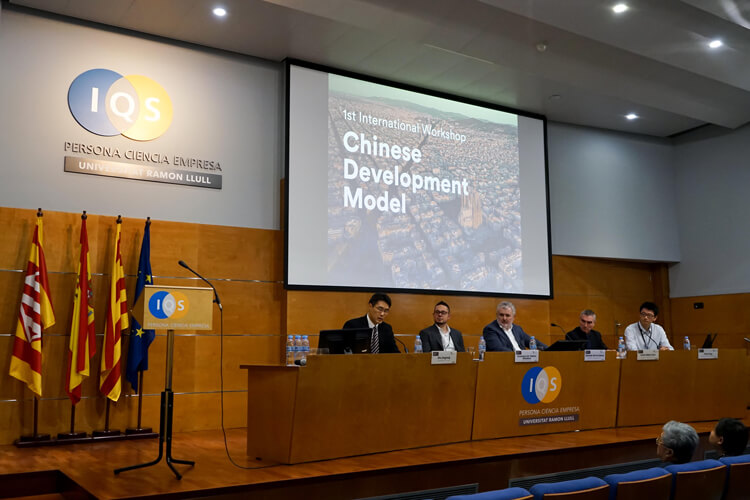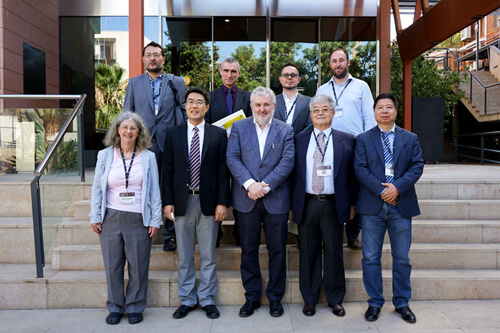IQS holds the first international workshop on the chinese development model
IQS recently hosted the first international worshop on the Chinese development model, entitled defying mainstream economic theories to achieve unprecedented progress. The event was organized by researchers and professors from the Social Economics & Ethics (SEE) research group at the IQS School of Management.
The study of China’s economic model is of great interest worldwide as China is the driver of global growth due to multiple factors, all of which are the subject of analysis and study by many experts.
A pioneering meeting with leading attendees
This is the first time such an event has been held. In the words of Dr Octasiano Valerio, a researcher from the SEE group who studies the Chinese economic model, “We are extremely satisfied with the results and the participation. This was the first edition of the event, but we want to hold it every year and become a research benchmark on the economy in China.”
The aim of this first workshop was, on the one hand, to highlight the current opportunities and challenges for economic, social, and national development, as well as China’s long-term goals. On the other hand, the objective was to explore ongoing and future reforms and how they will affect prosperity and international relations.
Welcoming around 50 attendees, the event featured more than 22 speakers from all over the world in various sessions who discussed seven fundamental themes of China’s economic model, including: internal migration, financial development, economic development, the labour market, sustainable development, human capital, and human development.
The event was attended by Mr Zhu Jingyang, Consul General of China in Barcelona, Dr Yizhe Dong, with the University of Edinburgh Business School and President of the Chinese Economic Association (UK/Europe), and Dr Yijiang Wang, with the Cheung Kong Graduate School of Business and founder and former President of the Chinese Economists Association.
Keynote speakers included Dr Barbara Fraumeni, NBER & Central University of Finance and Economics, Dr Jack W. Hou, California State University, Long Beach, and Dr Tony Fang, Memorial University of Newfoundland, who also participated in an interesting panel discussion entitled “Understanding China’s Economy: Achievements and Challenges for the Future.” The roundtable was held with the collaboration of Casa Asia, a public diplomacy organization based in Barcelona and created in 2001 to facilitate the exchange of cultures, ideas, and projects that share a common interest.
“Best Paper Award”
Within the context of the workshop, and aiming to attract quality speakers to it, the “Best Paper Award” competition was held for scholars under 36 years age, with the winner taking home a €1,000 prize. Seven of the 22 speakers submitted their papers for the award, which was won by Bowen Gu, a student at the Autonomous University of Barcelona (UAB), for her article “Black gold and green growth – environmental justice in China’s coal-based economy.”
The other two finalists were Da Gong, from the University of California, for his article “Cost of Zero-Covid: Effects of Anti-contagious Policy on Labor Market Outcomes in China,” and Francisco Javier Rodríguez Román, from the University of Cagliari, for his article “The Sex Ratio, Marriage and Bargaining: A Look at China.”
A specialized group in applied ethics work
The organizers of the event, research specialists in the areas of economics and applied ethics and members of the Social Economics & Ethics group, included Dr Flavio Comim, coordinator of the group, Dr Mihaly Borsi, and Dr Octasiano Valerio, who obtained one of the prestigious Marie Sklodowska Curie programme grants from the European Commission to carry out his research on the Chinese economic model. The group is also home to doctoral student Huaxin Wanglu, who recently won a “Barcelona Economics Society Friends of the Country Grant.”
Recent publications.
Valerio Mendoza, O. M., Borsi, M. T., Comim, F., Human capital dynamics in China: evidence from a club of convergence approach, Journal of Asian Economics,79, 2022, 101441.
Borsi, M. T., Valerio Mendoza, O. M., Comim, F., Measuring the provincial supply of higher education institutions in China, China Economic Review, 71, 2022, 101724.
This workshop has received funding from the European Union’s Horizon 2020 research and innovation programme under the Marie Sklodowska-Curie grant agreement No. 838534





